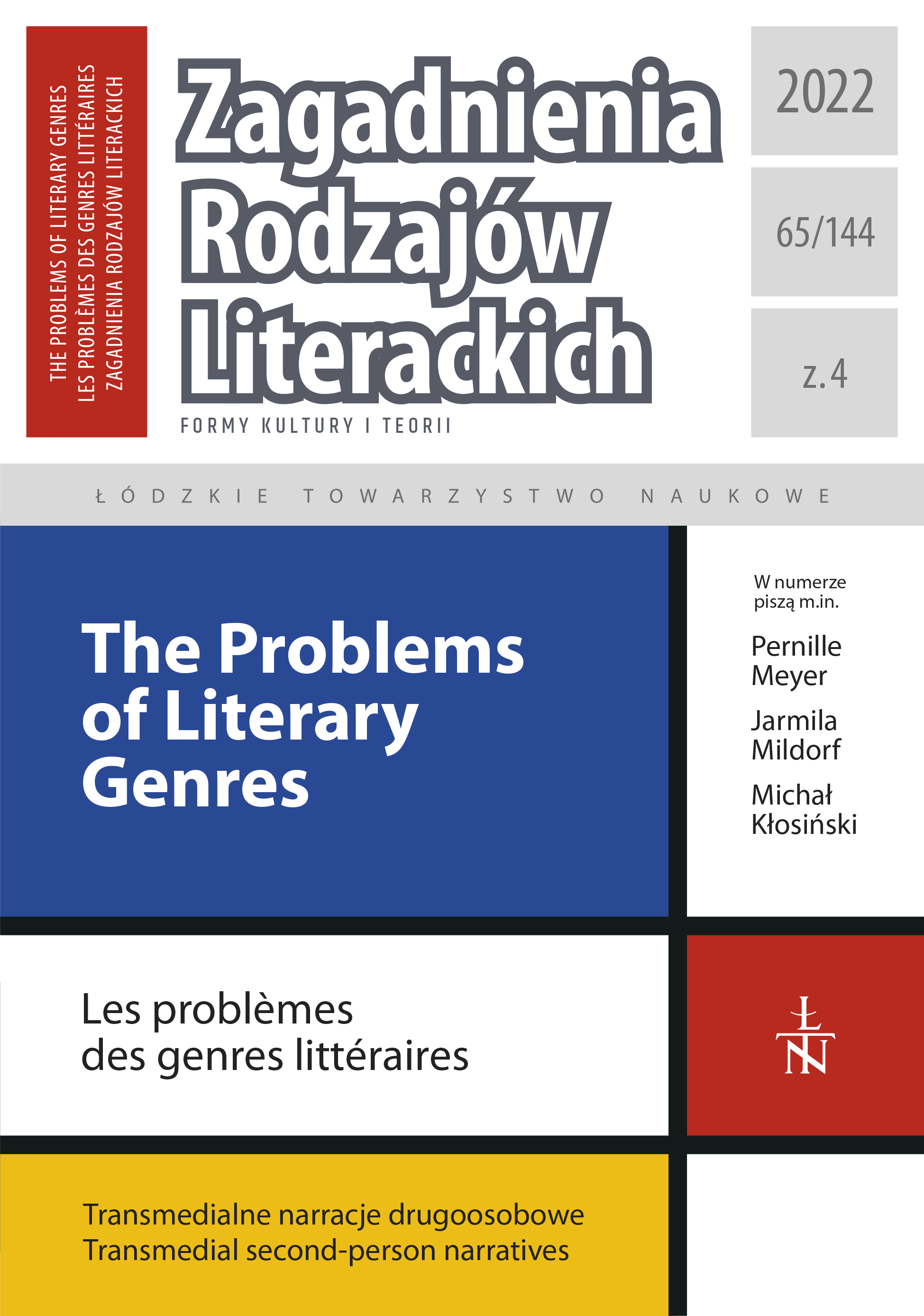Dialogical Functions of You-Narration in Auto/Biography: Anne Harich’s “Wenn ich das gewußt hätte…”: Erinnerungen an Wolfgang Harich (2007)
DOI:
https://doi.org/10.26485/ZRL/2022/65.4/5Keywords:
second-person narration, autobiography, biography, imaginary dialogue, fictionalization, narratologyAbstract
Ever since the 1970s, if not before, second-person narration has been used as an alternative storytelling format in auto/biography to expand the narrative possibilities of engaging with one’s own or someone else’s life. The second-person pronoun can support the author’s project of self-exploration while also offering a means for self-distancing. When someone else’s story is addressed to that person, this raises questions concerning the epistemics of the narrated events as well as the teller’s storytelling rights and authority.
This article explores the use of you-narration in an auto/biographical text by Anne Harich about her dead husband, Marxist philosopher Wolfgang Harich. The second-person narrative form is shown to serve various functions, ranging from creating an imaginary dialogue with the dead to expressing the author’s personal feelings about and perspectives on the life she lived with her husband. The analysis shows how Anne Harich, in imagining a conversation with her husband, vents her own pent-up frustration and points to her ambivalent attitude towards her marriage. The you-narrative parts fictionalize the otherwise non-fictional account and show that one needs to distinguish between the aspects of address at the level of the communication between narrator and narratee and reference in the story world of the you-narration.
Downloads
References
Auster Paul (2012), Winter Journal, Faber & Faber, London.
Auster Paul (2013), Report from the Interior, Faber & Faber, London.
De Man Paul (1979), Autobiography as De-facement, “MLN” no. 94(5).
Fludernik Monika (1993), Second Person Fiction: Narrative You as Addressee and/or Protagonist, “Arbeiten aus Anglistik und Amerikanistik” no. 18(2).
Harich Anne (2007), “Wenn ich das gewußt hätte…”: Erinnerungen an Wolfgang Harich, Das Neue Berlin Verlagsgesellschaft, Berlin.
Harich Wolfgang (2004), Nicolai Hartmann, Größe und Grenzen: Versuch einer marxistischen Selbstverständigung, ed. M. Morgenstern, Königshausen & Neumann, Würzburg.
Harich Wolfgang, Forster Paul (2018), Erwägungen zu Nicolai Hartmann: Versuch einer marxistischen Selbstverständigung in zehn Dialogen nebst einem Anhang [in:] W. Harich, Nicolai Hartmann: Der erste Lehrer, ed. A. Heyer, Tectum, Baden-Baden.
Harris Neil Patrick (2014), Choose Your Own Autobiography, Three Rivers Press, New York.
Herman David (1994), Textual ‘You’ and Double Deixis in Edna O’Brien’s A Pagan Place, “Style” no. 28(3).
Heyer Andreas, ed. (2016), Wolfgang Harich in den Kämpfen seiner Zeit, LAIKA, Hamburg.
Iliopoulou Evgenia (2019), Because of You: Understanding Second-Person Storytelling, Transcript Verlag, Bielefeld.
Kacandes Irene (2001), Talk Fiction: Literature and the Talk Explosion, University of Nebraska Press, Lincoln, Nebraska.
Keener Frederick M. (1973), English Dialogues of the Dead: A Critical History, An Anthology, and A Check List, Columbia University Press, New York.
Kinzel Till, Mildorf Jarmila, eds. (2012), Imaginary Dialogues in English: Explorations of a Literary Form, Universitätsverlag Winter, Heidelberg.
Kinzel Till, Mildorf Jarmila, eds. (2014), Imaginary Dialogues in American Literature and Philosophy: Beyond the Mainstream, Universitätsverlag Winter, Heidelberg.
Mason Mary G. (1980), The Other Voice: Autobiographies of Women Writers [in:] Autobiography: Essays Theoretical and Critical, ed. J. Olney, Princeton University Press, Harvard.
Mildorf Jarmila (2016), Reconsidering Second-Person Narration and Involvement, “Language and Literature” vol. 25(2).
Mildorf Jarmila (2019), Autobiography, the Literary and the Everyday in Paul Auster’s Report from the Interior, “Partial Answers” no. 17(1).
Mildorf Jarmila (2022), Durch Andere sich selbst erzählen: Figuren der Selbststilisierung in autobiographischen Schriften von Alan Bennett und Candia McWilliam [in:] Erzählte Welt: Sinnstiftung in Zeiten kultureller und politischer Umbrüche, eds. C. Schachtner, A. Drews, Evangelische Akademie, Loccum.
Morson Gary Saul (1998), Sideshadowing and Tempics, “New Literary History” no. 29.
Müller Hélène (2009), Miroir et mémoire. La deuxième personne et l’autobiographie: Trame d’enfance de Christa Wolf et Enfance de Nathalie Sarraute, „TRANS: Révue de littérature Générale et compare“ vol. 8, DOI: 10.4000/trans.307.
Parker Joshua (2012), Ecrire son lecteur: L’évolution de la deuxième personne, Éditions universitaires européennes, Paris.
Rauh Hans-Christoph (2021), Personenverzeichnis zur DDR-Philosophie 1945–1995, De Gruyter, Berlin.
Ruesch Jurgen, Bateson Gregory (1951), Communication: The Social Matrix of Psychiatry, Norton, New York.
Sarraute, Nathalie (1983), Enfance, Éditions Gallimard, Paris.
Sorlin Sandrine (2022), The Stylistics of ‘You’: Second-Person Pronoun and Its Pragmatic Effects, Cambridge University Press, Cambridge.
Wolf Christa (1976), Kindheitsmuster, Aufbauverlag, Berlin.







